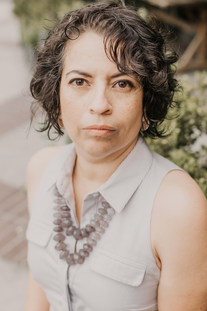|
1/2/2020 Learning to Drive - Mireya S. VelaWhen Tía Lupe arrives to pick me up, she honks the horn. I rush out. I don’t like to keep people waiting. When I’m close, she gets out of the car and walks around to the passenger door. Her car is loud and hot and filled with trash. I settle into the driver’s seat. I put on my seatbelt, adjust the mirrors and roll up my window. As I drive away from the curve, the bottles of soda rattle in the back. Lupe is calm and confident as she gives me instructions. She’s my mom’s niece but they’re the same age. She’s married to my dad’s younger brother. Unlike other families, the women in our family don’t drive. Tradition weighs heavily on us. Unlike getting married and having children, this is a choice. My mother doesn’t drive. Her mother doesn’t drive. My dad’s mother doesn’t drive. Primarily, the men drive. They decide where we go and when. My mother doesn’t leave without permission. Tía Lupe drives. When she leaves the house, she’s often followed by her husband. He spies on her, stalks her, watches her. I’ve been in the car, when she’s spotted him. My mom was in the front passenger seat. I was ten and sat in the backseat. Lupe pulled over and got out of the car to talk to him. I held myself still in patient tension as I watched him talk to her through the rearview mirror. Mom didn’t say anything. She looked forward. But I wondered with constricted breath what we would do if he hit her. It was a hot day and I remember the warm seats caused puddles of sweat beneath my thighs. I was relieved when she returned. I haven’t decided my place in the family yet. I’m 20. I want big things like independence and autonomy. I’d rather die than be stuck here. It seems so cliché, but I’d rather die than live without freedom. I don’t want to be my mother. I’m a practiced self-harmer. When I tell myself I won’t live without freedom, I do this with an escape plan in mind.  After I’m 30 and I leave El Monte—a city east of L.A.--again, I will have nightmares about being trapped here. Those nightmares will hold me into my forties and beyond that. “Now turn to the right,” she says, “We are heading to the mall.” “Okay,” I say. Her hair is long and permed into tight curls that tend to frizz. She’s a cloud of golden brown fuzz. She hates her forehead so she keeps her curly bands at eyebrow level. Her traditional aesthetic means she’s all dressed up and wearing heeled shoes. At this stage in the timeline of her beauty, her eyebrows are tattooed. Her lipstick is a freshly applied bright mauve. There’s a cassette tape playing loudly. I ask her to lower the music. “It’s fine,” she says. “It’s too loud.” “No, it isn’t. You have to learn to drive with distractions,” she says, “You are so young, you need to learn to live a little. Stop living like you’re an old woman whose life is over.” “It’s hurting my ears,” I say. “You’ll get used to it.” As I drive, my face is pinched and I have to take deep breathes. My senses are overloaded. And I’m angry that she’s ignoring me. I take deep breathes to calm down. But being with her right now, is one of the most joyous moments of my young adulthood. Despite how critical she is, she believes I might be something. She sees the possibilities of my life unfolding in front of me. I think she sees hope. As we drive, I wonder again who she is defying to teach me. It is her mother-in-law or my father or her husband? Is it my mother? How many are rooting for me to fail? Tia Lupe and I always had a tense relationship. She’s a declarative women with a deeply abusive past. She constantly rubs me the wrong way. She doesn’t like to hear me say “no” to her. But love is tricky. Lupe has been in my life from the beginning. She spends every weekend with us—with my mom. We are as close, but I know she also lies to me. We head to the mall, Lupe turns up the music and rolls down all the windows. She’s ablaze in sound and wind and the chaos of hair. I take a deep breath. In a few years, Lupe will be dead. And my mind will circle back to this moment between us again and again. A moment. What’s a moment? A moment can be everything. I doubt it took her longer than a moment to write that note and take those pills. In a single moment she decided she was done. She flung her head back and swallowed death. She probably didn’t even think of me. She comes once or twice a week to teach me how to drive. In that hour that we spend together, I smell her perfume. Beneath the chemically scent, I can smell her skin coming alive like a jungle. She wears tight pants and a loud patterned blouse. And she talks to me in clipped tones that are self-assured and unwavering. She has severe mental illness. But I don’t know this. She doesn’t share her stories with me. Her stories are making the rest of the family panic. Her omission feels like lies. I wonder later if she was as afraid of my judgement as I was of hers? My family doesn’t like me. I break their rules too much. I’m driven. I’ve graduated school with high honors. They act like they are proud. But I can tell something is wrong. My male cousins aren’t achieving what I’ve achieved. They aren’t graduating. My father’s family is wondering who the hell I think I am to usurp their men so easily. I come from a family of criminal immigrants. In my father’s family, the men dominate and somehow always end up in jail. They don’t believe in respecting the American system. They all came in illegally and live their lives skirting the edges of society. We aren’t really engaged. We aren’t really involved. We aren’t fully here. Part of them in still in Mexico. Part of me is stuck deeply in trauma. I’m at the edges of this family—a marginalized person within a marginalized group. Later, much later, I will feel betrayed by Lupe’s silence. I will be angry that my mother isolated me this way. And much later after that, I will understand that this isn’t anger. It’s grief. I adore her. Tía Lupe is a second mother, much bolder than my own. She somehow balances my mother’s unbending anxiety. Unlike my mom, Lupe talks more openly about her own anxiety and depression. Lupe talks about her bad marriage. And she complains a lot. She’s one long wail. Every weekend, my father’s family visits Grandmother Lola. She lives next door. After Lupe greets her mother-in-law, she comes over our house. Often, Lupe’s mom is also there. My mom, Belia and Lupe gather around the dinner table and talk about their husbands and their children. Sometimes, Belia’s other daughters visit as well. I prefer to stay in my room. But the laughing and the bellowing draw me out. It’s 11 AM on a Sunday. I’m 14 and believe people have no business visiting at such an early hour. I’m still in my pajamas. It’s Isabel laughing. When she laughs it’s a booming sound like the explosion of a tire on the highway. I wave as I head to the kitchen to grab something to eat. I’m quiet as I move about. Lupe is talking about her sons. “No, no. Boys are so gross. You should see how they leave the bathroom.” I cringe. I grab a bowl and set it softly on the counter. I open the fridge to take out the milk. There’s very little left. I miss the conversation as I lean into the fridge to see if there is more milk. “This is just so hard,” Lupe says, “I don’t really want to be around. I feel done.” She has two sons. Her oldest son is 15. The youngest is about 10 years old. “We all feel that way,” my mom says, “It’s just so important to remember what it says in the Bible.” I’ve heard my mom’ speech before. I pour out the cereal and head back into my room. They are here so often, I don’t think they should expect the niceties anymore. But there’s more to it than this. I’m afraid of their rejection. Inside me is my mom’s voice telling me that no one likes me. Isabel enthusiastically greets me. Tia Lupe makes some comment about how bland I am. My Tia Belia softly says, “Hi Mireyita.” She speaks in a voice that reminds me of children. I hide back in my room with the cereal I got from the kitchen. I sit in my room reading. When I’m done with the cereal, I set it down and begin to wonder when it’s okay to go out again. The women’s voices are a constant buzz against the walls of my room. I tell myself I hate the fact that they talk so much, but this isn’t true. I hate that I’m left out. I love that they are here. I love that they show up and unload and create worlds together. When I leave my room again, mom is talking about buying a plot of land in Mexico. “We can all live together,” mom says. “No,” Lupe says, “the kids are American. Besides that one would never agree.” “That one” is what she calls her husband. I set my dirty bowl on the counter. I walk by them again and close my door. For the rest of my life, I will think about this. I will wonder what loneliness drove her to end things. What was missing? But mostly, I will wonder what kind of person I needed to be for her to trust me. And this, this will change everything. It will change the way I see mental health. It will change the way I understand compassion. The responsibility I feel over the systems in our family that made her death possible--will change me. And for many days over the next decade I will wonder about her arms. I will wonder about the arm she tossed over her body as she lay dying and waiting. I will think about her inky veins visible underneath the pale pools of her skin that look like blue Danube china. Later, when I’m married, I will collect this china and store it in my laundry room. I won’t use it. But owning it will mean everything to me. I won’t understand why, because sometimes thoughts are imprinted in us like transferware and they just don’t leave. All of my life, I will love the elegance of blue against white. As dignified as her death was not. For decades I will wonder what she felt in those last moments. I will wonder about the thickness of her skin—translucent like a moth’s wing. For years later, I will wonder if death has lined us up like children ready to go home after the school day has ended. Had it, without my knowledge, put me in line after Lupe? I will spend hours thinking about this, wondering if my death is inevitable. Secure in my belief that depression is a deadly condition and I am next. Except that I’m not like Lupe. I am stubborn. I am a tenacious problem-solver. When my own son turns 17 and has a mental illness, I rail passionately about what suicide teaches those that are left behind. “It’s a damned legacy,” I will say to him. He’s sitting on the living room chair. I’m sitting on the rug in front of him. And I’m yelling. Which isn’t necessary. He exudes fragility. He’s trembling. His eyes are shiny with tears and his mouth is shut tight. I hang on to him hard and decide that if I don’t let go, he can’t leave me. But I keep thinking that I can pull him through by sheer force of will. The way I might have for Lupe. I find out about Lupe’s death as I’m walking into my mother’s house. I’m home from the mental hospital and still feel shaken from my own experience. The scars of her death will haunt me. I will wonder at what point she decided to overdose. At what moment did she decide that emotions aren’t temporary? At what moment did she believe that the depression would last forever? I will also wonder about how she had the courage to do this while I was in the hospital myself. Was she trying to tell me something? But right now, we drive.
Comments are closed.
|
AuthorOur fabulous blog team Archives
June 2024
CategoriesAll 12 Songs Art Art And Athletes Book Review Chorus Blog Date This Book Game Of Narratives Guest Blog Letter From The Editor Lifehacks Movies Of 2019 Music Pup Sounds Smackdown Strive For 55 Summer Playlists |





 RSS Feed
RSS Feed